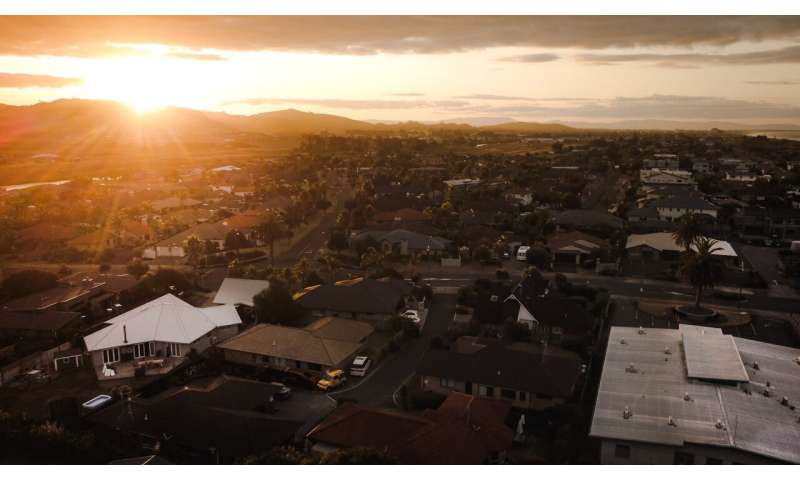Housing shortage a major contributor to Aotearoa's inequalities

A report published today puts a spotlight on housing through a fairness lens and finds that differences in housing is a large contributor to inequity in New Zealand.
The report is one in a series by Te Tapeke Fair Futures panel, convened by Royal Society Te Apārangi to consider a range of important public issues through a fairness lens.
"Differences in housing are a huge part of inequity in Aotearoa New Zealand," says panel member Distinguished Professor Philippa Howden-Chapman CNZM QSO FRSNZ, University of Otago—Wellington, "but the wide-reaching impact on our society also means that if we solve the housing issue, we all benefit, not just those struggling to find decent housing."
The report sets out a brief history of housing and looks at a number of topics such as Te Tiriti o Waitangi, affordability, home ownership, renting, priorities in public housing and homelessness.
"The housing shortage is critical," says Professor Howden Chapman. "It is showing up in increasingly unaffordable house and rental prices. Home ownership is at its lowest since the 1950s and renting has become less affordable. The waiting list for public housing continues to grow and homelessness is a serious problem that has grown with the housing shortage.
"There currently aren't enough affordable houses in New Zealand to meet demand, driven mostly by a combination of rapid population growth and a shortage of compact new builds for low- and modest-income households, close to neighborhood amenities and public transport."
Affordability
The report sets out that nearly a third of New Zealand households spent 30 percent or more of their total household income on housing costs in 2019—with a quarter of renters spending 40% or more of their income. This level of expenditure on housing affects wellbeing—cutting into budgets for food and other necessities like electricity and heating. By international comparisons, New Zealand households in the bottom fifth of incomes are severely overburdened by housing costs. Affordability is rated worst by single parents and disabled people.
Home ownership
According to the report, home ownership rates have been dropping steadily since the 1990s, down from 74% to 65% in 2018.
"This trend is contributing to the growth in inequity because home ownership has links to greater wealth, health and welfare over a lifetime. As shown in a recent Stats NZ Housing report, people who don't own their home usually have less security, poorer affordability and worse housing conditions," says Professor Howden-Chapman.
"Contributing to the drop in home ownership is that house prices have been rising faster than incomes. The median New Zealand house price was twice the median household income in 1980 but nine times the median household income by 2019. Despite this, New Zealand is not out of line with other OCED countries in terms of the mortgage burden borne by owner-occupiers.
"Māori and Pacific peoples, both predominantly young populations on lower incomes, have been significantly affected by falling home-ownership rates."
The report outlines that Pacific peoples suffered the greatest decline in home ownership with the proportion living in a house occupied by the owner falling by 35% between 1986 and 2013. This compares with a fall of 20% for Māori and 14% for Europeans.
Renting
About one third of New Zealand households and half the adult population now rent and this proportion is increasing.
"There are great divisions between those who own their house and those who rent," says Professor Howden-Chapman.
Despite high costs to rent, the latest House Condition Survey found 32% of rental properties were 'poorly maintained' compared with 14% of owner-occupied homes.
Renting can lead to health problems associated with low quality housing and poor heating, less stability (renters move more often) and the discrimination experienced by some people seeking to rent, says Professor Howden-Chapman.
Public housing
Public housing provides housing security for those who are not in a financial position to own their own home, or rent privately, but today's inadequate supply and high cost of private rental housing is putting increasing pressure on public housing, according to the report.
There were significant sales of state houses between 2008 and 2017. Government policies have changed, but the inevitable lags in construction have meant that despite current high record levels of construction by Kāinga Ora -Homes and Communities, and community housing providers, the waiting list for public housing doubled in the two years between 2017 and 2019 and continues to grow. As of 31 March 2021, there were more than 23,000 on the public housing waiting list.
Homelessness
The report shows that homelessness has risen over the past 30 years, with 41,600 estimated to be homeless in the 2018 Census and a further 60,000 defined as homeless because they were living in 'uninhabitable housing' that lacked basic amenities, such as electricity and potable drinking water.
Solutions
What should New Zealand do to ensure the vision of the Te Tapeke Fair Futures panel of a future where everyone can access affordable, safe, healthy housing that meets their needs and is culturally appropriate, regardless of whether they are renting, or own their own home? Actions the panel consider would assist progress towards more equitable housing include:
- adopting a shared vision, such as a housing equity charter based on the Treaty and UN Right to Housing
- improving the security and quality of private rental housing
- setting and upholding minimum standards for housing quality that go further than the Healthy Homes Guarantee Act 2017 to meet World Health Organization minimum standards and ensure accessibility
- providing culturally appropriate, uncrowded housing, including shared and progressive rent-to-buy ownership models
- continuing to work to balance housing supply and demand and offering secure tenure programs
- consideration and implementation of a number of consistently recommended tax and regulatory changes.
"Having secure, warm housing helps children thrive and keeps the young and old out of hospital. Improving housing equity will lead to people living healthier, more productive lives that they value," says Professor Howden-Chapman.
Provided by Royal Society Te Apārangi